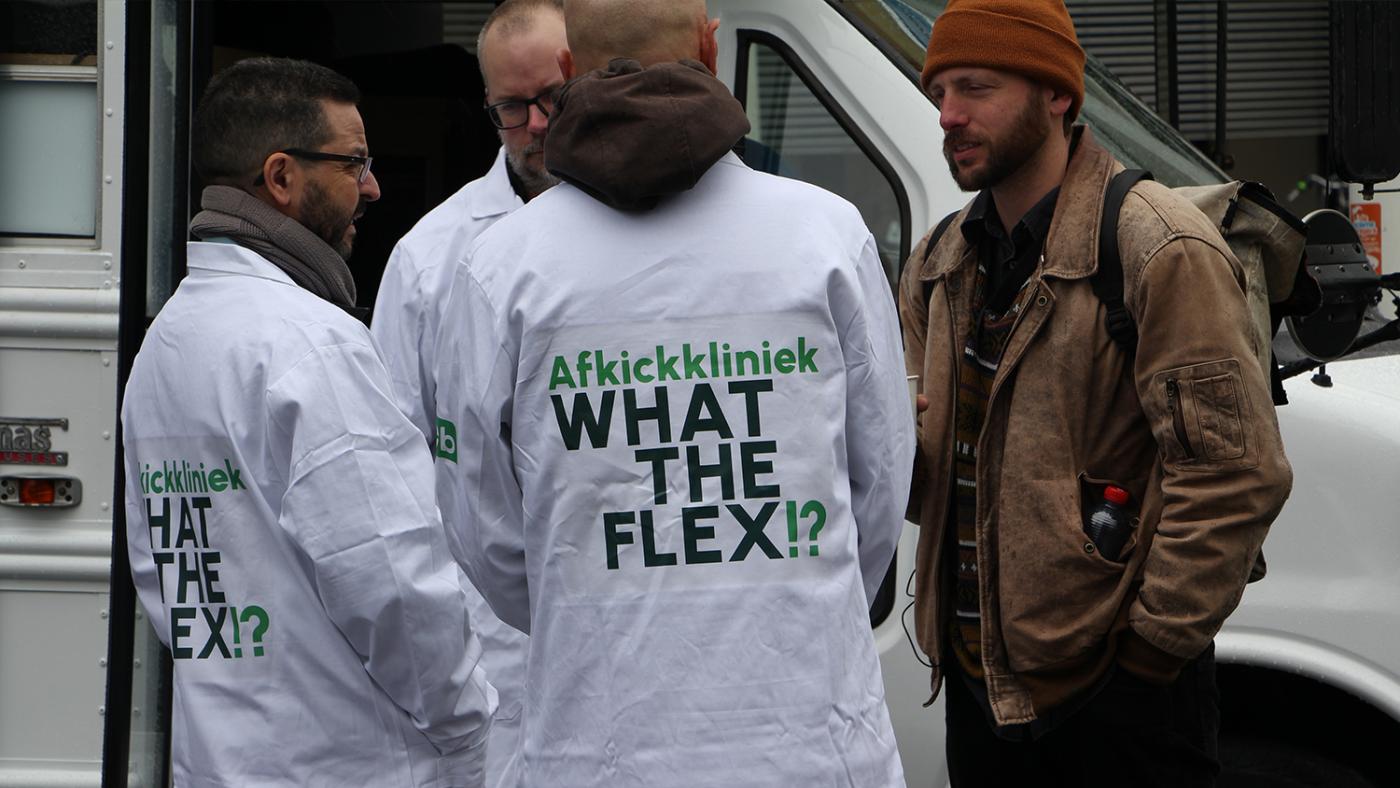Trade unions and Labour Representation Board about labour conditions
'At UU, getting better at your job doesn't pay off financially'

As trade union AOb protests outside the Administration Building, in the Utrecht Science Park, against the number of teachers under temporary contracts, DUB meets three UU employees who are active union members. As union members, they are also part of the University Labour Representation Board (ULRB), which gathers six times a year to negotiate labour conditions with UU President Anton Pijpers and Human Resources Director Aletta Huizenga.
The three union members are Paul ter Veld, who works with IT management and represents the trade union FNV; Mies van Steenbergen, research analyst at the Faculty of Sciences and a member of trade union CNV; and Tim de Winkel, PhD candidate and teacher at the Faculty of Humanities, who started opposing "flex" contracts with the protest group 0.7 and now does the same thing on behalf of AOb.
Lokaal Overleg is distributing 4.5 million euros
The ULRB addresses a wide variety of issues, such as travel allowances, fair remuneration, work pressure, career perspectives and the working atmosphere. In short, topics related to the labour conditions that apply to every Utrecht University employee. The union members see to it that the university sticks to the Collective Labour Agreement (Dutch acronym: CAO) for Dutch universities. They also make "agreements about additional arrangements," Paul ter Veld explains. To this end, the ULRB has approximately 4.5 million euros at its disposal annually, known as the labour conditions funds.
Mies van Steenbergen has a long list of regulations (page only accessible to whose with a Solis ID, Ed.) in front of him, of which some are financed with the labour conditions funds. The replacement of a colleague on maternity or parental leave is paid from these funds, for example, as are courses from the vitality programme and parts of the Equality, Diversity & Inclusion (EDI) programme. Even a small part of commuting expenses comes from these funds. Before the unions agree to a contribution, there’s often a hefty discussion beforehand: should this be paid with these funds or should it be part of UU's regular expenses?
“One of our key guiding principles is that the labour conditions funds should benefit as many people as possible. Another one is that we are keen to support new initiatives when it comes to groups of employees who are currently being short-changed. This is why some of EDI's projects are funded. We also want to contribute to the welfare of UU employees, and paying for the replacement of a colleague on parental leave is part of this. If there is no replacement, everyone in the department has to work more. Some departments are very small and have no money to pay for the replacement themselves,” Ter Veld explains.
As many employees as possible
Some of the things being paid for by the labour conditions funds remain a debating point, according to Van Steenbergen. A few years ago, the board asked to pay for the costs of English courses. “We did that for one year even though we actually think that those courses should be part of UU's regular expenses. Employees need English to do their jobs properly, so the money for these courses should come out of the university's own pockets.”
This year, a small part of the travel expenses for home-work commutes is being covered by the funds. UU employees are allowed to compensate 21 cents per kilometre tax free, of which UU has chosen to compensate only 10 cents. Of these 10 cents, 4 cents come from the labour conditions funds. “The unions are of the opinion that the university should pay more. After all, for many employees, living closer to the university is simply impossible. We ended up agreeing to pay this much because we had a lot of money left from Covid times. Back then, there were hardly following any courses, or no courses at all. But this arrangement is not enough.”
Trade unions have a minority voice
The negotiations with UU's Executive Board are a matter of give and take, says De Winkel. “Sometimes we win, sometimes we lose.” Representatives of trade unions are often criticised when a new collective labour agreement is disappointing or when a new regulation for UU employees doesn’t work very well. “The criticism is justified but people shouldn’t forget that trade unions have lost their strength over the years because there are fewer and fewer members.”
Ter Veld adds: “Currently, only a minority of UU employees are represented by unions. We would be stronger if we had more members. Granted, the number of members increased in the past two years, both nationwide and within UU. That's a sign that employees are not satisfied with the current policies, especially younger employees and those in the lower pay scales. The willingness to take action is also rising. They are realising that taking action works in other industries.”

Trade union AOb protests in front of the Administration building against the number of teachers on temporary contracts. Photo: DUB
A little extra to cope with rising energy costs
The ULRB operates almost invisibly as the consultations are not public, explains Van Steenbergen. "We negotiate directly with the Executive Board. We try to get the best for UU employees and we want to spend money on that. The board also wants to make improvements but is more concerned with the pennies."
Late last year, for example, the trade unions asked the board to give employees — especially those from the lower pay scales — a little extra money from the labour conditions funds so they could cope with inflation and the rising costs of electricity and gas. The proposal was turned down. Another suggestion was to pay the 13th month and holiday allowances in monthly installments. That one was successfully approved. “It took quite some time and perhaps it came way too late for some people, which is a shame. It exemplifies the sluggishness of the organisation,” sighs Ter Veld.
25,000-euro prize for combatting work pressure
In addition to co-deciding how the labour conditions funds will be spent, the unions in the ULRB see to it that the university's administration keeps to the agreements specified by the CAO. The current CAO expired on April 1 and the new one is likely to take a while, as the Ministry of Education will not announce how much room there is for a raise until the end of May. The unions are calling for a raise of 14.3 percent, as well as for work pressure and the number of temporary contracts to be significantly reduced.
Two sensitive topics at UU, where work pressure is relentlessly high and the number of temporary contracts is the highest among all universities in the Netherlands. The attempts to lower the work pressure don’t seem to be enough. Van Steenbergen says that 25,000 euros have been earmarked for a good plan on how to diminish workloads. "It doesn’t have to be a plan to reduce work pressure everywhere but if it helps 50 colleagues, that’s already something. Just saying ‘hire more people’ will not get you to win. Throwing some work over the fence won’t cut it either as one person will have less work but another one will have more. A good idea would be allowing a PhD candidate to graduate with three instead of four articles. The money is meant for the implementation of the plan.”
“As for the temporary contracts, we are diametrically opposed to the university's administration," Ter Veld states. UU has a policy of never giving permanent contracts to teachers who do not conduct research as well. Despite requests from trade unions, teachers and the University Council, the Executive Board has not yet announced a change in policy, as the universities of Rotterdam, Leiden and Amsterdam have done. “Undergraduate students have been taught by temporary teachers for years," observes Ter Veld. To which De Winkel adds: "Now these teachers are running off to the universities that do offer permanent contracts." Ter Veld: "It’s hard for us to negotiate when the board says that the faculties are not interested in giving permanent contracts. After all, the faculties are not in the room. The fear of reorganisations and having to lay off staff runs deep. Even among new managers. We've noticed that new professors are also afraid of offering permanent contracts."

A member of trade union AOb talking to UU President Anton Pijpers about temporary contracts in front of the Administration building. Photo: DUB
There should be more opportunities for career advancement
Asked what else needs to change for working conditions to improve at UU, the three union members follow with an entire list, starting with the lack of opportunities to advance in one's career with a corresponding increase in salary. “Getting better at your job doesn't pay off financially at UU,” says Ter Veld, who considers himself lucky because IT employees now have a development path. “Besides, we're often too old to be allowed to participate in certain trajectories" adds Van Steenbergen, a senior employee. “That’s just downright bad, there is a need for it. The course Cashing in on talent that's 55 and older was recently created for this group. Needless to say it was fully booked immediately."
In addition, the ULRB is concerned with the hierarchy at the university and the quality of managers. "Anyone who wants to become a manager depends on their supervisor to achieve that. If said supervisor does not recognise your talent or does not want to see them, forget it."
Once someone manages to become a manager, they don’t lose that position easily, which does not benefit the organisation, according to the trio. "You have to pull out all the stops to get fired, like the professor from the Faculty of Social Sciences recently who recently lost his job due to his inappropriate behaviour. But a manager who doesn't have certain skills usually isn’t degraded. They’ll just go to another department and get send on some course.”
Unsafe working environment
According to the unions, one of the consequences of a lack of skills on the part of managers is a working environment that doesn't feel safe. Conflicts can arise between supervisors and employees, for example. Being the first to complain to HR is not always the best route, says Ter Veld. "HR is always on the side of the employer. If you have a work-related problem and have a conversation with an HR employee about it, it can be a very pleasant conversation but you shouldn’t forget that you are talking to a party that, in the worst-case scenario, will be drafting your dismissal papers and gathering files that will make your life miserable." It makes more sense to bring someone along to an appraisal interview or a meeting with the HR officer, he recommends. You could bring a union counsellor who is more familiar with your rights as an employee, for example. "They can often take the sting out of the conflict because poor communication is often the root of the problem."
Unjustified dismissal
If escalation cannot be avoided, dismissal usually follows. Some 30 to 40 employees leave the university each year with a so-called settlement agreement (when the employee agrees to leave voluntarily and is given a severance payment). According to the trio, half of these dismissals are unjust.
"In the case of a researcher whose research has stalled, such an arrangement is justifiable from both sides. But there are also employees who are forced to leave, people who suddenly get a bad review after 20 years, usually after they get a new manager with whom they don't get along very well. You lose such a conflict by definition. A file is built up, a second bad assessment follows and they are nudged towards a settlement agreement. Often, these people are fed up with struggles that can last for years. They are told that they will be given a nice sum of money — part of which they lose in taxes, by the way — and then leave. Usually unjustified."
Therefore, there are many problems that the unions must tackle, including the new CAO. Yesterday, the unions were heading for the streets again to put pressure on the negotiations for a higher wage and more permanent contracts.